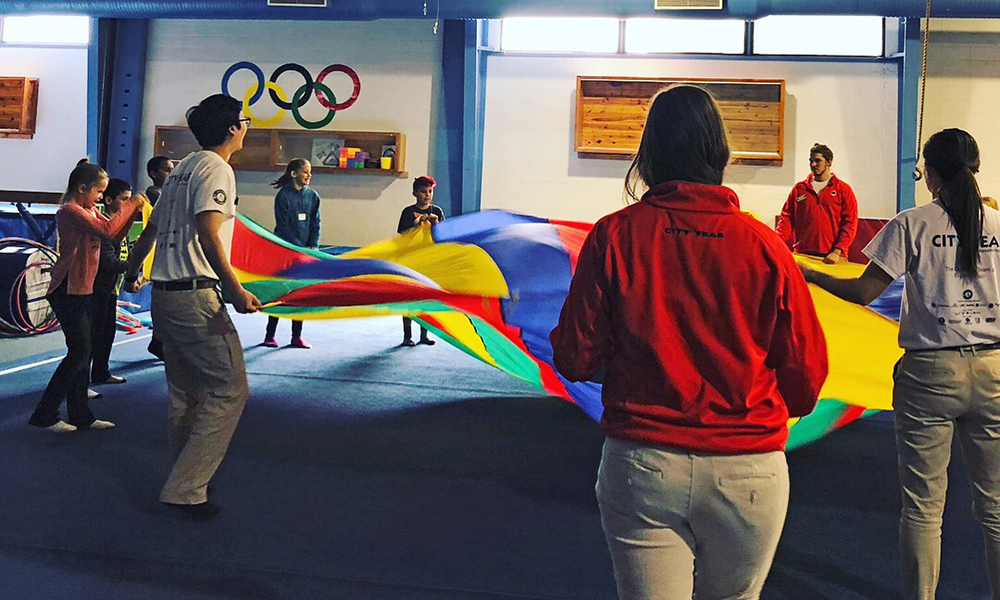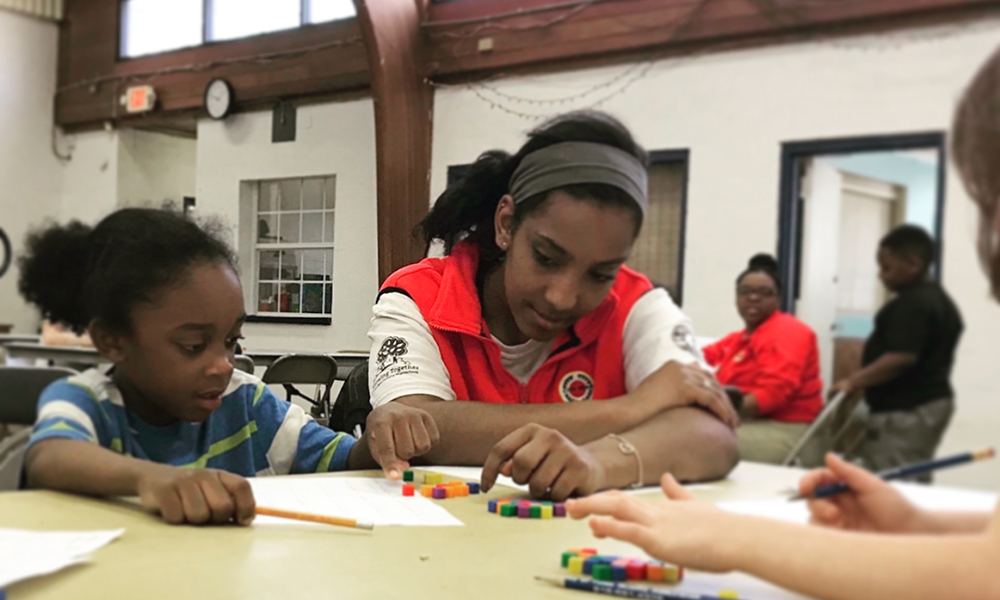
Photos by City Year Tulsa
A coalition of youth-serving organizations in Tulsa, Oklahoma, came together during the nine-day statewide teachers’ strike to provide educational activities and recreation for kids while school was closed. Americorps members serving in the nonprofit City Year ran all-day camps at two city parks and the Hutcherson YMCA.
The Tulsa Opera, yoga teachers, magicians and first responders helped after-school providers shift into high gear to provide free, full-day activities for kids during the recent teachers’ strike in Oklahoma.
The nine-day strike ended Friday, but not before 1,200 kids a day were taken care of for 12 hours a day at the six Boys & Girls Clubs of Metro Tulsa. The organization sent all its administrative personnel into the clubs and trained hundreds of adult volunteers in basic safety.
Tulsa Area United Way provided an online listing of more than 180 organizations offering assistance to families.
Eleven sites provided free full-day programming for kids, and free meals from Tulsa Public Schools were distributed at more than 70 locations, said Patrick Duhon, executive director of the Opportunity Project, a new city intermediary for expanded learning. The Opportunity Project coordinated some of the full-day sites, helping to arrange staffing, activities and meal distribution.
Many families in Tulsa public schools face food insecurity, said D.J. Morrow Ingram, development and community relations director of the Salvation Army. Nearly three-quarters of students in the school district receive free or reduced-prices lunches.
Groups expanded hours
Ninety-two organizations offered various educational activities for kids, according to the United Way website. Libraries extended their programming, Gilcrease Museum waived admission fees, churches expanded their child care and after-school programs.
City Year Tulsa sent its 74 AmeriCorps service members into city parks and to the Hutcherson YMCA to offer free full-day activities for more than 250 kids ages 5 to 17, said Paul Davis, vice president and executive director of City Year Tulsa.
“When the school walkout was announced we began planning actively. We realized how great the need would be,” he said.
Initially he was worried that the demand would be far greater than the city could meet.
But at the three sites staffed by City Year, “we saw that the number of students turned away each day [when capacity was reached] was small,” Davis said.

City Year participant works with child at Reed Park & Community Center in Tulsa.
Planning started early
Three weeks before the April 2 strike, when its likelihood became known, the Boys & Girls Clubs of Tulsa, which is run by the Salvation Army, began planning. It reached out to local businesses and trained several hundred volunteers in advance.
“We made the decision to open the clubs to any children and youth ages 4 to 17 that need a safe place to go from 7 a.m. to 7 p.m.,” Morrow Ingram said. About half the kids served had never been to the Boys & Girls Clubs before, she said.
The Boys & Girls Club of Broken Arrow, for example, normally serves about 82 kids a day, but was serving 320 on Thursday, she said.
The Boys & Girls Clubs has felt some backlash. Morrow Ingram said they have received phone calls from people saying they will never donate again.
But the goal was to protect families from having to choose between leaving kids at home alone or staying home with their kids and losing their job, she said.
Opinion polls show 72 percent of Oklahoma voters supported the strike led by the Oklahoma Education Association, which gained teachers a raise but did not succeed with some other demands.
Learning not neglected
To handle such a large number of kids, the clubs grouped them by age and rotated them among various activities, from art stations to the computer lab to the gym.
“But it’s not just 12 hours of playtime,” Morrow Ingram was quick to say.
Games with hidden educational aims were used, said Capt. Jessie Chapman, associate area commander of the Salvation Army and a former math teacher who stepped away from her managerial job to work with the kids.
For example, kids had to add or multiply numbers on dominoes as they played a domino, she said. Kids also amassed a “checking account” over the course of the day, which they could use to “buy” donated toys at the end of the day, she said.
The Tulsa Opera, which had not come to the Boys & Girls Clubs sites before, provided a music class each day. It taught musical symbols with bingo cards showing the symbols, Morrow Ingram said.
The police and fire departments did presentations to the kids, a yoga group led yoga, and Global Gardens taught gardening, she said.
Even a Christian magician group offered its services, she said.
“The community has been amazing,” Morrow said.
Duhon, of the Opportunity Project, said the quality of the educational activities offered during the strike was high.
“Tulsa is a unique place where people roll up their sleeves and join in,” he said.































